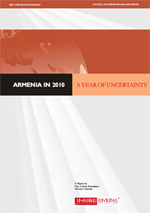
 PREFACE: This Report was launched three years ago to fill a gap – the missing Armenian perspective to the body of analysis about Armenia and the region offered by the international community.
PREFACE: This Report was launched three years ago to fill a gap – the missing Armenian perspective to the body of analysis about Armenia and the region offered by the international community.
These end-of-year reflections are intended to help grasp past policies and events, and serve as tools to shape the future.
2010 marked the culmination of nearly two decades of Armenia’s independence. Perhaps for that reason, given independent Armenia’s level of social, economic and political development, the reactions and assessments in this report are more severe.
The year 2011 will mark the beginning of the third decade of independent statehood. This will compel us to examine the causes for what most indexes and ratings consider inadequate external economic and political competitiveness and insufficient internal social and democratic transformation.
Successive governments have offered neither credible big-picture visions nor genuine short-term implementable solutions in response to citizens’ visible and understandable dissatisfaction. Nor have the drivers of civil society – media and non-governmental organizations — demonstrated the readiness, judjment and wisdom to ask and debate the profound questions.
These are some of the urgent questions to be asked:
• What are Armenia’s necessary security requirements?
• How to revamp Armenia’s domestic political system to make it healthy and inclusive?
• What should the educational system offer in order to nurture identity and also transform a small nation into a competitive global participant?
• What is the acceptable tradeoff between individual liberties and the collective good?
• How far is Armenian society willing to go to protect the most vulnerable?
• How to wisely and genuinely disentangle politics from business interests?
• How to introduce liberal, open, government supports for deep, sustainable, broad-reaching economic growth?
• What price is Armenia willing to pay to protect the environment, for healthy, ecological and economic benefit?
• How to enable true publicly accessible quality health care?
• How to instill trust and hope in the justice system?
• How to secure the integrity of soldiers as individuals and the armed forces as an institution?
• How to achieve essential Armenia-Diaspora cooperation?
In each of the significant areas of people’s daily lives, what should be the policy objectives? The answer should be the affirmation found in the Armenian Constitution: to turn Armenia into a sovereign, democratic, social state governed by rule of law.
Anniversaries offer the benefit of hindsight and at the same time, inevitably intensify expectations. Armenia’s 20th year to come will be no exception.
INTRODUCTION: This publication is intended to be an annual overview of the political and economic situation in Armenia, as well as those global and regional developments that affect this country and the region.
We had described 2009 as the year of promise and reality. It was a year that promised far more than it delivered as borne out by regional, domestic and political realities.
In Armenia in 2010, glaring catastrophes or evident achievements were absent even as the economic and political troubles continued to take a real toll. That this sort of standstill was itself an obstacle to economic and political progress became obvious given the steps that were not taken.
In 2010, the region’s internal uncertainties were compounded by global uncertainties vis-à-vis the region. Whether as a result of the US-Russia resetting of the previous year, or a series of choices forcibly or voluntarily made, the inclusion of the Caucasus in the Russian sphere of influence became more pronounced.
There was no improvement in Armenia’s relations with its eastern and western neighbors. When Armenia-Turkey protocols were frozen, so were official Ankara-Yerevan relations. This ended up disappointing the optimists, baffling the mediators and vindicating the critics.
As for the Karabakh negotiation process, in 2010, it entered a phase of uncertainty, unpredictability and danger.
Internally, Armenian society saw a growing tension between personal freedoms taken for granted, and an expectation of greater civic freedoms. The result was a growing number of home-grown citizen initiatives in an otherwise politically unremarkable year. The middle class searched for prosperity and well-being in an economically and politically unpredictable and non-transparent environment. As a result, instead of middle class contentment nurturing a country of optimists, middle class discontent fed a growing legion of pessimists.
This was further aggravated by a recognition that institutions both in the economic and public sphere – from schools to police to tax collectors – appeared to be structurally unchanging, and therefore perhaps unchangeable. Both the international community and the country’s own citizens began to view this not as a very long wave of uncertainty, but a permanent state of capitulation.
Economically, the government utilized all available fiscal and monetary options to dig its way out of the economic crisis. It succeeded to the extent that it prevented financial circumstances from deteriorating further. But in 2010, the government could not or would not tackle politically sensitive reforms. As a consequence, the lack of diversity and competitiveness, as well as interdependence of businessmen and government officials remained the fundamental impediments to economic growth.
Indeed, in 2010, there were fundamental structural impediments to growth all around – politically, economically and socially. So, the year ended as it began – with personal and national uncertainty.
